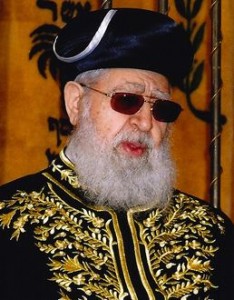Abdullah Ovadia Yousseff (1920-2013) was born in Baghdad, Iraq and immigrated with his family to Jerusalem at the age of 4. He was quickly recognized as a young prodigy with a photographic memory and a profound depth of understanding, and ordained as a rabbi at age 20. Shortly after, Rav Ovadia moved to Cairo, Egypt where he headed a yeshiva and Jewish court until his return to Israel upon the State’s independence. In 1952 he published the first of several great works, which propelled him into the spotlight. He then founded an advanced yeshiva for gifted students. By 1973, Rav Ovadia was appointed Israel’s Sephardic Chief Rabbi. He served in this post until 1984 when he founded the Shas political party – today the 4th largest in the Knesset – and served as its spiritual guide until his last days. A scholar above all else, he pored through thousands of works. Once, he tumbled off a ladder while reaching for a book, breaking his back. As no one was there to help him, he grabbed the nearest text and studied it for 3 hours until someone found him. Possessing a great love for the Jewish people, Rav Ovadia always strove to make life simpler for the Jews, earning a reputation for being very lenient when it came to Jewish law. He was heavily engaged in kiruv – bringing secular Jews back to their heritage and into the spiritual fold. He especially focused his efforts on Mizrahi and Sephardic Jews (who often suffered discrimination and a lower socio-economic status in Israel) and is thus credited with restoring Jewish and national pride among this demographic. Many stories highlight his love and service to the people. Once, he suffered a heart attack and was rushed to hospital for life-saving surgery. He had the surgery delayed for several hours as he was in the middle of writing a letter to a woman in distress, and feared that if he died there would be no one to help her. Sadly, Rav Ovadia passed away on Monday. Nearly a million people attended his funeral in Jerusalem – the largest funeral in Israel’s history. Many have hailed his passing as the end of an era in the country’s history.
Words of the Week
The righteous promise little and do a lot; the wicked promise much and don’t do even a little.
– Talmud, Bava Metzia 87a


